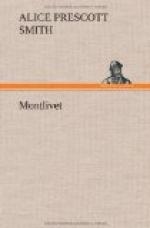For a moment I thought that I had found nothing. But I looked again, and saw that my eyes had been made blank by fear. For my men were massed to east and west. They pressed nearer and nearer, and the moon picked out points of light that marked knives and arquebuses. Some wore uniforms, and some were naked and vermilion-dyed, but all were watching me. I could not see their eyes, but I was conscious of them.
I pointed the chiefs to the prospect. “You see. I have only to whistle, and we shall settle this question of who is master here. Seize me, and I shall whistle. But I shall do nothing till you move first. If we are to have war, you must begin it. Are you ready?”
Silence followed. It was a hard silence to me to get through calmly, for I knew that my men were not so numerous as they appeared, and I feared to be taken at my word. Pemaou glided up and spoke to his father. I had not seen him since the night in the Seneca camp, and I argued with myself to keep my head cool so that I should not spring on him. His body was blackened with charcoal, and he wore a girdle of otter skin with the body of a crow hanging from it. I had sometimes been called the crow because of my many tongues, and I understood his meaning. But I could only stand waiting, and the moments went on and on.
It was a small thing that determined the issue. In the distance Pierre began to whistle,—Pierre, the bridegroom of the morrow, the merry bully of the night. He had a whistle in keeping with his breadth of shoulder, and he used it like a mating cock. He whistled my tune, the signal. It was not accident, I think, neither was it design. It was his unconscious, blundering black art, his intuition that was witchcraft.
The Baron drew himself up. He put out a protesting hand, and his dignity of gesture would have shamed an Israelitish patriarch.
“We called our brother to council. What does our brother mean? He is moon-mad when he talks of war in the house of his friends, the Hurons.”
I yawned in his face. “You called me to council? But the council is to-morrow night. The commandant calls it. Save your fair words for him.”
I turned on my heel to leave, but the Baron held me. He eyed me above his blanket.
“My brother has been called the man who steals the Indian’s heart from his body,” he purred at me. “He has stolen mine. The commandant is a fool; I cannot talk to him. But to you, my brother, I can open my heart. Come with me to my lodge and listen. You shall be safe. In token of my love I give you this calumet,” and he took his great feathered pipe—the pipe that means honor to the lowest of savages—and would have thrust it in my hands.
I was too nonplussed to remember to laugh. An offer to buy me, and from the Indian who hated me most! They must indeed be afraid of me,—and with what little cause. Where had my reputation come? I knew my own weakness. Well, I must play on my fame while it lasted. So, without deigning to answer, I turned away. My troops hedged me like a wall as I went back to the French camp, but I did not speak to them. It was strange to see them melt before me. I did not wonder that the Hurons smelled witchcraft where, in fact, there was only bluster and a pleading tongue.




